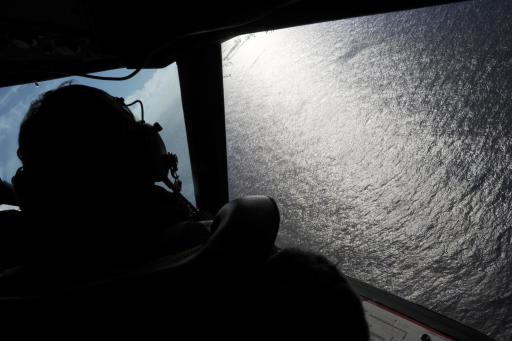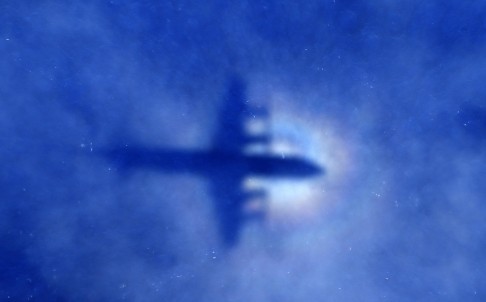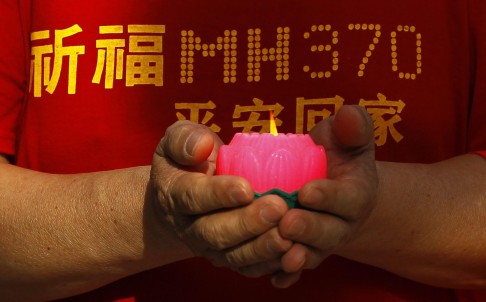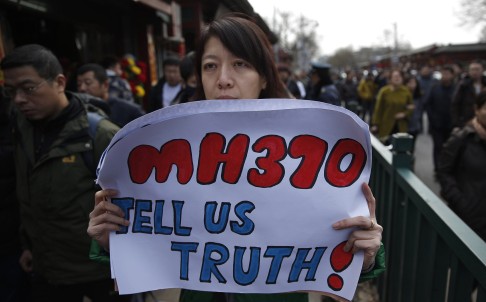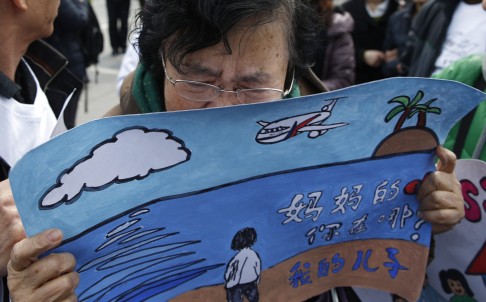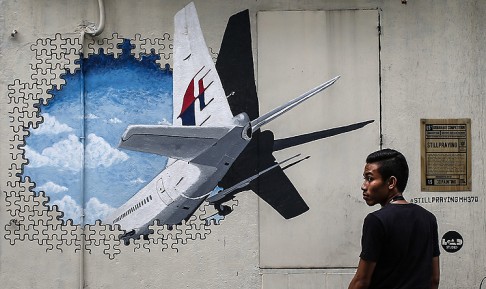Timeline: The fruitless year-long hunt for MH370
AFP
March 8, 2015, 7:28 pm
Kuala Lumpur (AFP) - One of the most baffling aviation mysteries in history seems no closer to being solved as the first anniversary of Malaysia Airlines Flight MH370's disappearance passes on March 8.
Following is a timeline of major developments in the disappearance of the Boeing 777 and its 239 passengers and crew:
March 8, 2014
-- Flight 370 departs Kuala Lumpur at 12:41 am, bound for Beijing. It vanishes from Malaysian civilian radar at 1:30 am, just before passing to Vietnamese air traffic control. It appears on military radar until 2:15 am, but Malaysia's air force takes no action.
-- Vietnam launches a search operation that expands into a multinational hunt in the South China Sea.
-- Two passengers who were travelling on stolen EU passports spark speculation of a terrorist attack, but are revealed to be merely suspected Iranian illegal immigrants. Malaysian police later say background checks of all on board produced no red flags.
March 9
-- Malaysia's air force chief says the plane may have turned back towards Kuala Lumpur for no apparent reason, citing radar data. In the coming days, the search area expands to the west of the Malaysian peninsula and the air force confirms the blip on its radar was indeed MH370.
March 14
-- The hunt spreads far south to the Indian Ocean after the White House cites "new information" that the jet may have flown on after losing contact.
March 15
-- At a dramatic news conference, Malaysian Prime Minister Najib Razak says the plane appears to have been flown deliberately for hours, veering sharply off-route at roughly the same time that its communications system and transponder were manually switched off.
-- Satellite data suggests the jet's last known location was somewhere along one of two huge arcs stretching north into Central Asia and south into the Indian Ocean. The South China Sea search is called off.
March 16
-- With more than two dozen countries now involved in the search, suspicions focus on the pilot and co-pilot, both Malaysians. FBI experts examine the hard drive on a flight simulator in Captain Zaharie Ahmad Shah's home, but find nothing suspicious.
March 20
-- Australia says satellites photographed two large objects in the remote southern Indian Ocean, but the flotsam proves to be another in a series of a false alarms.
March 24
-- Najib announces "with deep sadness and regret" that MH370 is presumed to have crashed in the Indian Ocean, citing new analysis of satellite data.
The next day in Beijing, emotional Chinese relatives of passengers scuffle with guards outside the Malaysian embassy, demanding answers.
March 31
-- Malaysia releases a transcript of all the pilots' radio communications, but it sheds little light.
April 4
-- A US-supplied "black box" detector begins scanning the suspected crash zone, with the clock ticking on the one-month battery life of their locator beacons.
April 5
-- A Chinese search ship detects an underwater "pulse signal" in the Indian Ocean. More "pings" are detected by other vessels in subsequent days, but they cease before they are pinpointed. Some experts later express doubt they were related to MH370.
April 14
-- Halting the search for underwater signals, Australia deploys an American deep-sea drone to scan the seabed for debris near the ping sites. It ultimately finds nothing.
April 28
-- Australia announces the search area will be expanded across a huge swathe of ocean. The focus shifts for several months to mapping the uncharted seafloor before searching can resume.
May 27
-- After weeks of pressure from families, Malaysia releases raw satellite data used to determine the search zone. Relatives say crucial data was omitted.
October 6
-- A Malaysia-contracted vessel resumes the sonar search of the seabed for debris. Three specialised Dutch search ships eventually join an effort expected to wrap up in May 2015.
2015
January 29
-- Malaysia's government declares MH370's passengers and crew "presumed dead", angering next of kin who demand proof.
February 4
-- Prompted by the MH370 mystery, a global aviation summit in Montreal backs plans to require real-time tracking of any airliners that encounter distress, starting in 2016.
February 25
-- Australian authorities say vessels have completed scanning about 40 percent of a 60,000-square-kilometre (23,166-sq-mile) "priority search area" -- and found nothing.
March 1
-- Australia says it is conducting trials with Malaysia and Indonesia of a system that increases the frequency with which planes are tracked over remote oceans, to avoid an MH370 recurrence. Several days later Malaysia Airlines says it has increased the frequency with which it tracks its aircraft.
March 7
-- Malaysia says the hunt for MH370 will be "sent back to the drawing board" if the search now under way comes up empty, echoing earlier remarks by Australian officials.
-- The sister of Captain Shah defends her brother against suggestions he may have played a role in the flight's disappearance, calling him a "man of integrity".
March 8
-- Grieving relatives mark one year since MH370 disappeared. Malaysia Airlines holds a private ceremony for staff and the families of the flight crew at its headquarters, while an association of MH370 families organises a separate public event in Kuala Lumpur.
-- Australia says the search for the plane will extend beyond its current scope if necessary, appearing to diverge from earlier comments saying it could be scaled back but giving no further details.
-- An interim report by an international investigative team formed in the weeks after the plane vanished hands over its findings on the sequence of events leading up to the disappearance.



